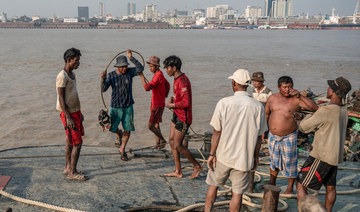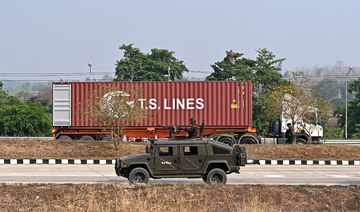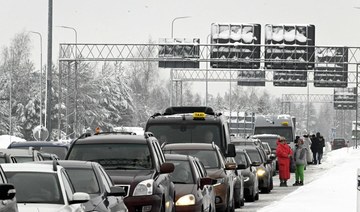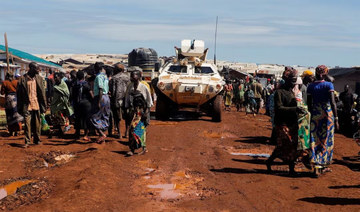BANGKOK: Six months into an offensive against Myanmar ‘s military government, opposition forces have made massive gains, but civilian casualties are rising sharply as regime troops increasingly turn toward scorched-earth tactics in the Southeast Asian country’s bitter civil war.
There is pressure on all fronts from powerful militias drawn from Myanmar’s ethnic minority groups and newer resistance forces. Troops are retaliating with air, naval and artillery strikes on hospitals and other facilities where the opposition could be sheltered or aided.
“When the mass of people rise up against them, I think it terrifies them,” said Dave Eubank, a former US Special Forces soldier who founded the Free Burma Rangers, a humanitarian aid organization that has provided assistance to both combatants and civilians in Myanmar since the 1990s.
“They know that hospitals, churches, schools and monasteries are important places for human care, and gathering, and symbols — and they hammer them,” said Eubank. “That’s new.”
Military forces now control less than half the country, but are holding on tenaciously to much of central Myanmar including the capital, Naypyidaw — recently targeted by drone attacks — and largest city, Yangon, and is far better armed than the resistance forces, with support from Russia and China.
“People have been saying that the regime was on the brink of collapse since two weeks after the coup,” in February 2021, said Morgan Michaels, an analyst with the International Institute of Strategic Studies who runs its Myanmar Conflict Map project.
“On the other hand, obviously the regime is weaker than it’s ever been.... so there’s no doubt that it’s in serious, serious trouble,” he said.
Thet Swe, a spokesman for the military government, denied that troops were targeting buildings and areas where civilians were sheltering, blaming their destruction instead on the opposition forces, without citing evidence.
“The military never harmed hospitals, churches and civilians in our country,” he told The Associated Press in an email. “They did not use that strategy and are fighting the rebels only for the sovereignty of our country.”
As the fighting has moved into more populated areas, about 1 million people have been forced to flee their homes since the start of the offensive in October, contributing to the more than 3 million internally displaced people in the country of some 56 million, according to the UN’s humanitarian aid agency.
With the collapse of its health care system and food supplies dwindling, 18.6 million people are in need, up 1 million from a year ago, including 6 million children, the agency said.
How it began
Opposition in Myanmar, also known as Burma, had been growing since the army seized power from the elected government of Aung San Suu Kyi in February 2021, but it gained new momentum in October when major militias known collectively as the Three Brotherhood Alliance launched a joint offensive.
Together, the Arakan Army, the Myanmar National Democratic Alliance Army and the Ta’ang National Liberation Army — among the most powerful militias formed by Myanmar’s ethnic minorities — made quick advances.
As they captured huge swaths of territory largely in the north and northeast, including economically important border crossings with China and several major military bases, other ethnic armed groups sensed momentum and joined the fighting.
At the same time, People’s Defense Forces — armed resistance groups that support the shadow National Unity Government, which views itself as Myanmar’s legitimate administration — have been increasing in number and launching their own attacks, often supported and trained by the ethnic armed militias.
Both sides claim they have inflicted heavy tolls. And the military government under Senior Gen. Min Aung Hlaing has acknowledged it is under pressure, recently reintroducing conscription to increase its ranks.
That has pushed some young people into the resistance. Many more have fled to rural areas or neighboring countries to avoid fighting.
With the violence across its border, China helped broker a ceasefire in Myanmar’s north in January with the Three Brotherhood Alliance. But the alliance’s Arakan Army continues to fight in its home Rakhine state in the west and has made significant gains, while PDFs and other ethnic armed groups continue their own attacks elsewhere.
The latest fighting
The fiercest fighting in recent weeks has been in the southeast, where the main ethnic Karen fighting force, the Karen National Liberation Army, claimed in early April to have seized all the military bases in Myawaddy, the main town on the border with Thailand in Kayin state, also known as Karen state.
One army battalion clung to a position beside one of Myawaddy’s two bridges, assisted by the Border Guard Force, a rival Karen group that had been in charge of border area security for years, conducting lucrative business by providing protection to area casino resorts with links to organized crime.
The force, which declared itself neutral in January, now controls the town with military government administrators still in place, highlighting how some militia groups still prioritize their own interests.
“This is not a black and white situation. This is not the regime reconquering and reconsolidating control,” Michaels said of the fighting in the area. “This is the regime hanging on, keeping a foothold by the razor’s edge.”
Meanwhile, the military has pushed KNLA and People’s Defense Forces out of Kawkareik, a strategically important town along the road that connects Myawaddy with the rest of the country.
Thousands of civilians have fled Myawaddy and Kawkareik. But many civilians haven’t managed to escape.
At least 1,015 civilian deaths have been documented from Nov. 1 through May 1, according to the Assistance Association for Political Prisoners, a watchdog group that tracks political arrests, attacks and casualties. It says 4,962 civilians have been killed overall since the military took power three years ago.
The watchdog blamed the deaths on the military’s increasing use of scorched-earth tactics and fighting moving into more populated areas.
“The military has increasingly lost areas of control in recent months, which has only increased their use of this strategy, responding with airstrikes, shelling and so on in civilian areas,” the AAPP said in an email.
The group added that the number of civilian deaths in the recent months of fighting is likely double what it reported, if not more, but that it can’t document the numbers due to the intensification of the conflict.
Kyaw Zaw, a spokesperson for the shadow National Unity Government, said the military had destroyed 343 hospitals and clinics since it took power, and that those attacks had accelerated in the last two months, though he didn’t have specific details.
Eubank, with the Free Burma Rangers, said he and his teams operating near the front lines have witnessed the military, known as the Tatmadaw, fighting with a ” speed and force and a viciousness that we’ve never seen.”
But in fighting a common enemy, the resistance is showing growing unity, he said.
“The Burma army is still stronger than any of these resistance groups, and if they want to bring a division or two to bear, they will win the battle, but they’re not stronger than everybody else together,” he said.
What comes next
Whether that unity will continue if the regime falls, and if the disparate resistance forces can agree on a common path ahead for Myanmar, is an open question, Michaels said.
“On one hand, Myanmar is not Syria — there is common cause in fighting the regime,” Michaels said. “But at the same time, as the regime has receded from some areas, there are at least indicators of potential future conflicts between groups.”
He noted an incident in northern Shan state last month in which troops from two members of the Three Brotherhood Alliance — the Myanmar National Democratic Alliance Army and the Ta’ang National Liberation Army — traded fire over a territorial dispute. One person was injured.
The groups quickly agreed to stand down, but the incident illustrates that territorial tension is real, Michaels said.
An opposition politician still inside the country, speaking on condition of anonymity for his own safety, said Myanmar’s people have a common desire for peace and stability, but the various factions still pursue their own interests.
“It is hard to predict what is ahead, and they still don’t have a single political direction or goal. I think there is quite a problem in this situation,” he said.
“Myanmar is now at a crossroads.”
Civilian casualties rise in Myanmar’s civil war as resistance forces tighten noose around military
https://arab.news/8m8as
Civilian casualties rise in Myanmar’s civil war as resistance forces tighten noose around military
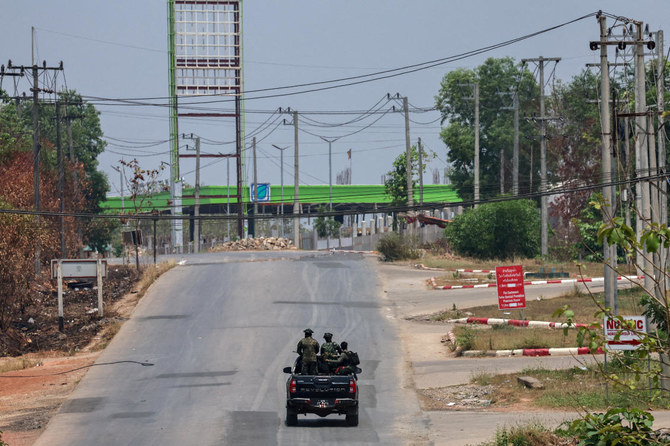
- An estimated one-third of those displaced are children, according to the UN statement
Biden tells Morehouse graduates that scenes in Gaza from the Israel-Hamas war break his heart, too

- “Your voices should be heard, and I promise you I hear them,” Biden said as protesters called for end to war in Gaza and liberation of Palestinians
- Biden also condemned Donald Trump’s rhetoric on immigrants as he stepped up effort to reach out to Black constituents
ATLANTA: President Joe Biden on Sunday offered his most direct recognition of US students’ anguish over the Israel-Hamas war, telling graduates of historically Black Morehouse College that he heard their voices of protest and that scenes from the conflict in Gaza break his heart, too.
“I support peaceful nonviolent protest,” he told students at the all-male college, some of whom wore Palestinian scarves known as keffiyehs around their shoulders on top of their black graduation gowns. “Your voices should be heard, and I promise you I hear them.”
Biden said there’s a humanitarian crisis in Gaza, “that’s why I’ve called for an immediate ceasefire to stop the fighting” and bring home hostages still being held by Hamas after its militants attacked Israel on Oct. 7. The president’s comments came near the end of a commencement address in which he also reflected on American democracy and his role in safeguarding it.
“It’s one of the hardest, most complicated problems in the world,” Biden said. “There’s nothing easy about it. I know it angers and frustrates many of you, including my family. But most of all I know it breaks your heart. It breaks mine as well.”
To date, Biden had limited his public comments around the protests on US college campuses to upholding the right to peaceful protest.
The speech — and a separate one he gave later Sunday in Detroit — are part of a burst of outreach to Black constituents by the Democratic president, whose support among these voters has softened since their strong backing helped put him in the Oval Office.
Biden spent much of the approximately 30-minute speech focused on the problems at home. He condemned Donald Trump’s rhetoric on immigrants and noted that the class of 2024 entered college during the COVID-19 pandemic and following the murder of George Floyd, a Black man killed by a Minneapolis police officer. Biden said it was natural for them, and others, to wonder whether the democracy “you hear about actually works for you.”
“If Black men are being killed in the street. What is democracy?” he asked. “The trail of broken promises that still leave Black communities behind. What is democracy? If you have to be 10 times better than anyone else to get a fair shot.”
Anti-war protests have roiled America’s college campuses. Columbia University canceled its main commencement ceremony. At Morehouse, the announcement that Biden would be the commencement speaker drew some backlash among the faculty and those who oppose the president’s handling of the war. Some Morehouse alumni circulated an online letter condemning administrators for inviting Biden and solicited signatures to pressure Morehouse President David Thomas to rescind it.
The letter claimed that Biden’s approach to Israel amounted to support of genocide in Gaza and was out of step with the pacifism expressed by Martin Luther King Jr., Morehouse’s most famous graduate.
The Hamas attack on southern Israel killed 1,200 people. Israel’s offensive has killed more than 35,000 Palestinians in Gaza, according to health officials in the territory.
In the end, there were no disruptions of Morehouse’s commencement while applause for Biden mostly was subdued. At least seven graduates and one faculty member sat with their backs turned during Biden’s address, and another student draped himself in a Palestinian flag. Protesters near the ceremony carried signs that said “Free Palestine,” “Save the Children” and ”Ceasefire Now” as police on bikes kept watch.
On stage behind the president as he spoke, academics unfurled a Congolese flag. The African country has been mired in a civil war, and many racial justice advocates have called for greater attention to the conflict as well as American help in ending the violence.
During his speech, valedictorian DeAngelo Jeremiah Fletcher, of Chicago, said it was his duty to speak on the war in Gaza and recognize that both Palestinians and Israelis have suffered. He called for an “immediate and permanent ceasefire in the Gaza Strip.”
Graduate Kingsley John said, “the temperature on campus was expected given we had the president of the United States come and speak.” John said he stood “in solidarity” with his classmates and that Biden “seemed to be reflective and open to hear the feedback.”
Morehouse awarded Biden an honorary doctor of laws degree. After accepting the honor, he joked that, “I’m not going home” as chants of “four more years” broke out in the audience. Biden then flew to Detroit to address thousands attending the local NAACP chapter’s annual Freedom Fund dinner.
Georgia and Michigan are among a handful of states that will help decide November’s expected rematch between Biden and Trump. Biden narrowly won Georgia and Michigan in 2020 and he needs strong Black voter turnout in Atlanta and Detroit if he hopes to repeat in November.
Biden spent part of the past week reaching out to Black constituents. He highlighted key moments in the Civil Rights Movement, from the 70th anniversary of the landmark 1954 Supreme Court decision in the case of Brown v. Board of Education that outlawed racial segregation in public schools to the Little Rock Nine, who helped integrate a public school in Little Rock, Arkansas, in 1957. He also met with members of the “Divine Nine” Black fraternities and sororities.
At the NAACP dinner, Biden told a largely Black crowd that numbered into the thousands that Trump wants to pardon those who were convicted of crimes during the insurrection at the US Capitol on Jan. 6, 2021, and calls them “patriots.” He suggested that Trump would not have been so kind had they been people of color.
“Let me ask you, what do you think he would’ve done on Jan. 6 if Black Americans had stormed the Capitol?” Biden asked. “What do you think? I can only imagine.”
The speech gave Biden a chance to reach thousands of people in Wayne County, which historically has voted overwhelmingly Democratic but has shown signs of resistance to his reelection bid.
The county also holds one of the largest Arab American populations in the nation, predominantly in the city of Dearborn. Leaders there were at the forefront of an “uncommitted” effort that received over 100,000 votes in the state’s Democratic primary and spread across the country.
A protest rally and march against Biden’s visit took place in Dearborn in the afternoon.
In Detroit, guests at the NAACP dinner were met by over 200 pro-Palestinian protesters outside the entrance to the convention center. They waved Palestinian flags, held signs calling for a ceasefire and chanted “free, free Palestine.”
“Until Joe Biden listens to his key constituents, he’s risking handing the presidency to Donald Trump,” said Lexi Zeidan, a protest leader who help spearhead a protest effort that resulted in over 100,000 people voting “uncommitted” in February’s Democratic primary.
UK and Finland to deepen ties in face of ‘Russian aggression’: London

LONDON: Britain and Finland will sign a new strategic partnership on Monday to strengthen ties and counter the “threat of Russian aggression,” the UK foreign minister said.
The two countries will declare Russia as “the most significant and direct threat to European peace and stability,” according to a Foreign Office press release.
The agreement will be endorsed by Britain's Foreign Secretary David Cameron and his Finnish counterpart Elina Valtonen in London.
“As we stand together to support Ukraine, including through providing military aid and training, we are clear that the threat of Russian aggression, following the war it started, will not be tolerated,” said Cameron.
“This strategic partnership, built on our shared values, will see the UK and Finland step up cooperation to bolster European security as well as seize new opportunities, from science and technology to closer energy ties,” he added.

The countries will work together to counter Russian disinformation, malicious cyber activities and support Ukraine’s recovery, reconstruction, and modernization, according to the Foreign Office.
Since Russia’s 2022 invasion of Ukraine, Finland has joined the NATO military alliance and shut off much of its border with Russia. Britain is a major military supporter of Ukraine.
Spain recalls ambassador after Argentina’s Milei calls PM’s wife ‘corrupt’

- Spain’s main opposition party, the conservative People’s Party (PP), refused to support Madrid’s stance, with party sources saying that Sanchez should have provided explanations about the alleged corruption case weeks ago
MADRID: Spain recalled its ambassador to Buenos Aires for consultations on Sunday after Argentina’s President Javier Milei made derogatory comments about Spanish Prime Minister Pedro Sanchez’s wife during a far-right rally in Madrid.
Milei had called Sanchez’s wife Begona Gomez “corrupt” during a rally in Madrid organized by the far-right Vox party and attended by many of its international allies.
Spanish Foreign Minister Jose Manuel Albares said he expected an apology from Milei.
Other ministers also condemned Milei’s speech, in which he described socialism as “cursed and carcinogenic.” Sanchez leads Spain’s Socialist Party.
“With his behavior, Milei has brought the relationship between Spain and Argentina to its most serious state in recent history,” Albares said in a video statement.
Milei would not apologize, his spokesperson said in an interview with an Argentine TV channel later Sunday. Spanish officials should retract insults they have made against him, he added.
Milei’s visit broke with diplomatic protocol as he refused to meet Spain’s King Felipe and Sanchez, instead preferring to promote his book alongside Vox leader Santiago Abascal at the party rally.
The European Union’s foreign policy chief, Josep Borrell, said in a post on social messaging app X that “attacks against family members of political leaders have no place in our culture.”
Spain’s main opposition party, the conservative People’s Party (PP), refused to support Madrid’s stance, with party sources saying that Sanchez should have provided explanations about the alleged corruption case weeks ago.
“His silence generates internal doubts, but also distrust abroad,” a PP source said, adding that the party’s job was to oppose the Spanish government and not Milei.
A city court said in April it was looking into accusations of influence peddling and business corruption against Sanchez’s wife, brought in a private complaint by Manos Limpias, or Clean Hands, an anti-corruption activist group.
However, Madrid’s prosecuting authority later said it was appealing to have the case thrown out for lack of evidence.
Sanchez decided to stay in office after five days of weighing his future once the probe against his wife was announced.
DR Congo military says it thwarted ‘coup attempt’, arresting 40 attackers and killing leader

- Army spokesman said some of the arrested attackers were foreigners and four — including their leader — were killed
- The coup plotters reportedly carried flags of Zaire, the DRC's name under dictator Mobutu Sese Seko, who was overthrown in 1997
KINSHASA: The DR Congo military on Sunday said it had thwarted an “attempted coup” near the offices of President Felix Tshisekedi in Kinshasa involving “foreigners and Congolese.”
It happened in the early hours of the morning outside the residence of Economy Minister Vital Kamerhe, in the Gombe area in the north of the capital, near the Palais de la Nation that houses the president’s offices, a spokesman said.
“An attempted coup d’etat has been stopped by the defense and security forces,” said General Sylvain Ekenge in a message broadcast on national television.
Shots were also heard near the Palais de la Nation at the time of the coup attempt, according to a number of sources.
Later on Sunday, army spokesman General Sylvain Ekenge said several Americans and a British man were part of the group involved in the operation.
The coup bid was led by Christian Malanga, a Congolese man who was a “naturalized American” and had been “definitively neutralized” — killed — by the security forces, Ekenge said in a broadcast on Sunday evening.
The group was made up of “several nationalities,” Ekenge said, adding that around 40 of the attackers had been arrested, and four — including Malanga — killed.
“We also have a naturalized British subject, the number two of the group,” the spokesman added. Malanga’s son, Marcel Malanga, was also among the attackers, he said.
Links to deposed dictator
Kamerhe and his family were not harmed in the attack but two police officers looking after them were killed, said a source close to the minister.
The group had planned to attack the home of the new Prime Minister Judith Suminwa, and the residence of Defense Minister Jean-Pierre Bemba.
But they “could not identify the home” of Suminwa and had not been able to find Bemba at his residence.
After the attack at Kamerhe’s home, the group then went to the Palais de la Nation, brandishing flags of Zaire, the name of the Democratic Republic of Congo under the dictator Mobutu Sese Seko, who was overthrown in 1997.
“I am shocked by the events this morning and very worried by the reports of American citizens allegedly being involved,” Lucy Tamlyn, the US ambassador to the DRC, posted on X, formerly Twitter.
“Rest assured that we are cooperating with authorities in DRC to the fullest extent possible, as they investigate these criminal acts and hold accountable any American citizen involved.”
France’s ambassador had reported automatic weapon fire in the area, urging nationals to avoid it.
During the day, certain streets near the Palais de la Nation remained closed to traffic, but the situation appeared calm, AFP journalists reported.
“I’m a little afraid to move around like that in Gombe, there aren’t many people... But I have to sell my goods,” bread-seller Jean-Mbuta said.
Videos on social media showed men in fatigues at the Palais de la Nation, brandishing flags of Zaire.
The Zaire flag was mostly green while the DRC one is largely blue.
“The time has arrived, long live Zaire, long live the children of Mobutu,” a man who appeared to be the head of the group said in Lingala, a language spoken in parts of the DRC.
“Felix has fallen... we are victorious,” he added.
AFP was also unable to verify the videos.
Tshisekedi was re-elected at the end of December when he received more than 70 percent of votes in the first round.
The parties backing him won around 90 percent of seats in the parliamentary elections held the same day.
But he is yet to form a government some five months after the elections.
Kamerhe on April 23 was named as a candidate for president of the National Assembly, the DRC’s main legislative body.
Daesh group claims deadly Afghanistan attack on tourists

- The attack is believed to be the first deadly assault on foreign tourists since the Taliban returned to power in 2021 in a country where few nations have a diplomatic presence
KABUL: The Daesh group on Sunday claimed responsibility for an attack targeting tourists in Afghanistan that killed three Spaniards and three Afghans.
The terrorist group said in a statement on its Telegram channels that “fighters shot at Christian tourists and their Shiite companions with machine guns” in the mountainous city of Bamiyan on Friday.
The tour group was fired on while shopping in a market in Bamiyan, around 180 kilometers (110 miles) west of the capital Kabul.
The terrorists said they attacked a “bus of tourists who are citizens of coalition countries,” referring to a US-led coalition that has battled Daesh in the Middle East.
“The attack comes in line with the directives of the leaders of the Daesh to target nationals of coalition countries wherever they may be,” the statement added.
Taliban officials said on Saturday they had arrested seven suspects in the aftermath of the attack.
The number of bombings and suicide attacks in Afghanistan has reduced dramatically since the Taliban authorities took power.
However, a number of armed groups, including IS, remain a threat.
The terrorists have repeatedly targeted the historically persecuted Shiite Hazara community, considering them heretics.
Hazaras make up the majority of the population in Bamiyan province, Afghanistan’s top tourist destination.
The attack is believed to be the first deadly assault on foreign tourists since the Taliban returned to power in 2021 in a country where few nations have a diplomatic presence.
Increasing numbers of visitors have traveled to Afghanistan as security has improved since the Taliban ended their insurgency after ousting the Western-backed government.
The Taliban government has yet to be officially recognized by any foreign government.
It has, however, supported a fledgling tourism sector, with more than 5,000 foreign tourists visiting Afghanistan in 2023, according to official figures.
Western nations advise against all travel to the country, warning of elevated risks of kidnappings and attacks.
The group targeted in Friday’s attack was made up of 13 travelers from various countries, including six Spanish nationals.
Spanish officials said Sunday that all three Spaniards killed in the attack were from Catalonia.
They included a mother and a daughter and a 63-year-old man who worked as an engineer.
An 82-year-old Spanish retiree was seriously wounded and was evacuated to a Kabul hospital operated by the Italian NGO Emergency, where she and others injured in the attack were stabilized.
“She is progressing favorably from her injuries, but her prognosis is uncertain,” the Spanish foreign ministry said Sunday.
Spanish diplomats had traveled to Afghanistan and had been working to repatriate the bodies of the dead and transfer the wounded, in coordination with a European Union delegation in Kabul.
The Spanish embassy in Kabul was evacuated in 2021, along with other Western missions, after the Taliban took back control of the Afghan capital.



